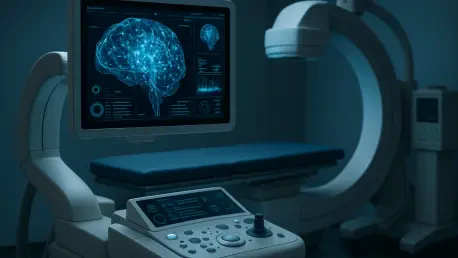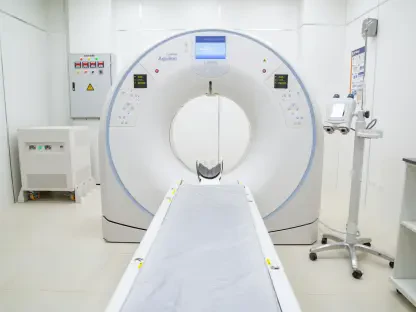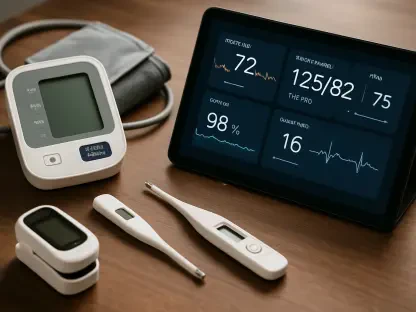In a landscape where technology and healthcare increasingly intersect, a significant shift has emerged from Alphabet Inc.’s life sciences arm, Verily, as it has decided to discontinue its entire medical device program to concentrate on artificial intelligence (AI) and data infrastructure. This bold pivot, announced through an internal memo from CEO Stephen Gillett, reflects not only the company’s response to economic pressures but also the growing dominance of AI as a transformative force in healthcare. Once known for groundbreaking hardware projects like smart contact lenses and surgical robots, Verily is now channeling its resources into AI-driven solutions for data analysis and personalized medicine. This strategic realignment underscores Alphabet’s determination to remain a frontrunner in the competitive AI arena while navigating the financial challenges of its experimental ventures. As this development unfolds, it raises critical questions about the future of hardware in biotech and the broader implications for innovation in the sector.
Strategic Overhaul and Economic Pressures
The decision to abandon medical device development at Verily marks a profound change in direction, driven by the need to focus on scalable technologies with higher potential returns. The company, previously invested in initiatives like diabetes management tools and precision health devices, is now reallocating capital to AI applications that promise to revolutionize healthcare through predictive analytics and data platforms. This move aligns with Alphabet’s overarching strategy to prioritize AI dominance, as seen in its investments across other units like Google DeepMind. However, the closure of the medical device program, executed with urgency, also highlights the economic uncertainties facing tech giants. With investors demanding profitability from experimental divisions, Verily’s pivot suggests a calculated response to streamline operations and focus on areas with faster paths to market impact. The undisclosed layoffs accompanying this shift further emphasize the tough choices being made to adapt to current market dynamics.
Beyond the immediate strategic rationale, this overhaul reflects broader industry trends where fiscal prudence often overshadows speculative innovation. Verily’s history of ambitious “moonshot” projects has been tempered by the realities of high development costs and regulatory hurdles in the medical device space. Analysts suggest that Alphabet’s focus on AI is not just about technological promise but also about positioning Verily as a more attractive entity for future financial moves, potentially including an initial public offering. This shift away from hardware raises concerns about whether promising solutions for real-world medical needs might be sidelined in favor of trendier, AI-focused initiatives. The tension between long-term innovation and short-term financial goals is evident, as Verily navigates a path that prioritizes efficiency over the continuation of complex, hardware-intensive projects. This recalibration could set a precedent for how other tech-driven health companies balance risk and reward.
Implications for Healthcare Innovation
Verily’s pivot to AI holds significant potential to reshape healthcare through data-driven insights, particularly in areas like drug discovery and personalized treatment plans. By leveraging AI, the company aims to accelerate breakthroughs in predictive analytics, which could enable earlier disease detection and more tailored medical interventions. This focus on scalable platforms over physical devices suggests a vision where software and algorithms drive the next wave of health advancements. Alphabet’s considerable resources and expertise in AI position Verily to potentially lead in this space, outpacing competitors who remain tied to hardware development. Yet, the abandonment of medical device projects, such as those addressing immune profiling, prompts debate about whether critical, tangible solutions are being sacrificed for technologies that may take years to fully mature or prove their worth in clinical settings.
Critics of this strategic shift argue that the emphasis on AI might reflect a short-term fascination with a hyped technology at the expense of hardware innovations that address immediate patient needs. The human cost of this transition, including layoffs of skilled employees who worked on these projects, cannot be overlooked. Many of these professionals now face an uncertain job market, with some likely to transition to startups or rival firms where their expertise in medical devices could find new outlets. Meanwhile, the broader health tech sector watches closely, as Verily’s move could signal a trend among large tech companies to prioritize digital solutions over physical tools. The debate continues on whether this focus will ultimately benefit healthcare or leave gaps in innovation where devices once promised to fill urgent needs. The long-term impact of this pivot remains to be seen, but it undeniably alters the trajectory of Verily’s contributions to medicine.
Reflecting on a Transformative Shift
Looking back, Verily’s decision to shut down its medical device program and embrace AI represented a critical turning point driven by both strategic necessity and market trends. The move mirrored Alphabet’s broader push to consolidate resources around high-growth areas, even as it meant stepping away from hardware projects that once defined the company’s ambitious vision. The layoffs and restructuring that accompanied this change underscored the challenging balance between innovation and financial discipline that many tech-driven entities faced during this period. While the pivot positioned Verily to potentially lead in AI-powered healthcare solutions, it also sparked reflection on what was lost in terms of device-based advancements that could have directly addressed pressing medical challenges. As the dust settled, the industry took note of how such decisions reshaped the priorities within life sciences.
Moving forward, the lessons from Verily’s transformation could guide other companies in navigating similar crossroads between cutting-edge technology and practical impact. A key consideration for the sector lies in fostering hybrid approaches that integrate AI with hardware where feasible, ensuring that neither avenue is entirely neglected. Stakeholders might also explore partnerships or spin-offs to preserve valuable device initiatives rather than fully discontinuing them. As Verily forged ahead with its AI focus, the broader tech and healthcare communities were left to ponder how to sustain diverse innovation pipelines. The path ahead likely involves continuous adaptation to economic realities while safeguarding the human and scientific capital invested in groundbreaking ideas. This moment in Verily’s history served as a reminder that strategic shifts, while necessary, must be paired with foresight to maintain a balanced ecosystem of progress.









